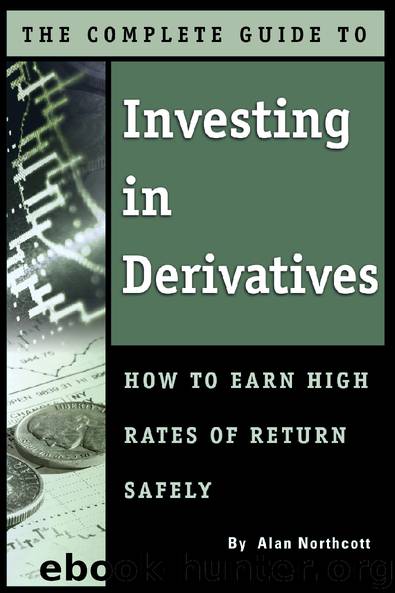The Complete Guide to Investing in Derivatives: How to Earn High Rates of Return Safely by Alan Northcott

Author:Alan Northcott
Language: eng
Format: epub
Tags: derivatives, investment, high returns, contracts, swaps, risks, trade, rates, market
Publisher: Atlantic Publishing
Published: 2012-01-23T00:00:00+00:00
Pricing Options
Pricing options is more difficult than pricing futures or forwards as it involves a transaction that may not happen, depending on the price movements. It is hard to decide on a value for a contract when the profit or loss does not vary smoothly, as with futures, and is uncertain. The fact that the buyer of an option only takes it up if it is profitable means, in theory, the odds of profitability are built into the premium paid, but as the rewards are variable, there is no easy solution as in the cash and carry method.
First, consider the extremes. A call option allows purchase of the shares at the option price, regardless of where the shares are trading on the expiration date. Without waiting for the expiration, you could buy the shares at the current market price and have them at the expiration date regardless of their value then. Therefore, any call option can be worth no more than the actual stock price; if it were, you would be better off buying the shares now rather than the option. Similarly, a put option cannot cost more than taking a short position in the stock.
These are the extreme positions, but it is possible to be much more precise when pricing individual options. One of the most well-known ways of determining a fair price for European options is known as the Black-Scholes model. Myron Scholes and Robert Merton, who also worked on the model, received the Nobel Prize for it in 1997, more than 20 years after their initial work.
The premium paid for an option consists of two parts. One part is called the intrinsic value, always zero or above, and the other part is the time value. The intrinsic value must always be above zero because the holder of the option is never obliged to exercise it, which allows traders to avoid incurring negative values. The time value is an amount that represents the chance the option will be in the money on expiration. The longer the option has to run, other things being equal, the greater the time value, as it represents the chance the price will change to make the option in the money or increase the amount by which it is in the money.
It is possible to delve in much greater depth into option pricing using calculus, but on the assumption most readers do not have mathematics degrees, the essential concepts necessary to trading options will be discussed in layman’s terms.
Any discussion of option pricing must be based on probabilities. The outcome is, obviously, unknown, so the value is based on the range of possible future values of the option and the probabilities of each occurring. Every model developed to derive a fair option premium must be based on this concept.
Concept of expected payoff
The start to valuing an option is to consider the expected payoff. This is an idea used in economics that helps decide whether to make a risky investment or take a chance on a bet.
Download
This site does not store any files on its server. We only index and link to content provided by other sites. Please contact the content providers to delete copyright contents if any and email us, we'll remove relevant links or contents immediately.
International Integration of the Brazilian Economy by Elias C. Grivoyannis(110460)
The Radium Girls by Kate Moore(12018)
Turbulence by E. J. Noyes(8040)
Nudge - Improving Decisions about Health, Wealth, and Happiness by Thaler Sunstein(7693)
The Black Swan by Nassim Nicholas Taleb(7110)
Rich Dad Poor Dad by Robert T. Kiyosaki(6613)
Pioneering Portfolio Management by David F. Swensen(6289)
Man-made Catastrophes and Risk Information Concealment by Dmitry Chernov & Didier Sornette(6007)
Zero to One by Peter Thiel(5789)
Secrecy World by Jake Bernstein(4741)
Millionaire: The Philanderer, Gambler, and Duelist Who Invented Modern Finance by Janet Gleeson(4469)
The Age of Surveillance Capitalism by Shoshana Zuboff(4279)
Skin in the Game by Nassim Nicholas Taleb(4239)
The Money Culture by Michael Lewis(4198)
Bullshit Jobs by David Graeber(4179)
Skin in the Game: Hidden Asymmetries in Daily Life by Nassim Nicholas Taleb(3992)
The Dhandho Investor by Mohnish Pabrai(3760)
The Wisdom of Finance by Mihir Desai(3735)
Blockchain Basics by Daniel Drescher(3574)
